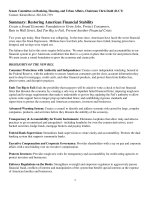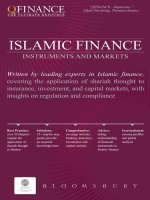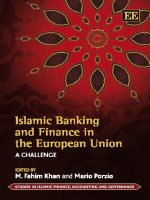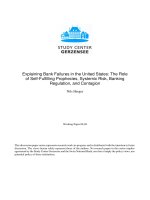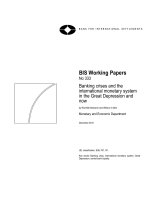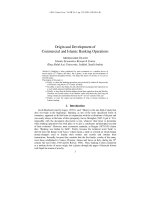islamic banking concepts and understanding orientation session
Bạn đang xem bản rút gọn của tài liệu. Xem và tải ngay bản đầy đủ của tài liệu tại đây (897.45 KB, 32 trang )
Islamic Banking
Concepts and Understanding
Orientation Session (Part ONE)
Muhammad Najeeb Khan
Shari 'a Advisor
Summit Islamic Banking
5
Sharia’s Commands
Deeds
Batin (Internal
Deeds)
Good Conduct
Bad Conduct
Ethics
Zahir (External
Deeds
Ibadaat
Muamalaat (Financial Dealing)
Mua’shrat (Social Dealing)
Jinayaat
Aqidah / Beliefs
The Organogram of Sharia's Commands
Rulings of Shari 'a
• TYPE • ACTION
• Fard / Wajib (Obligation)
• Mandoob (Recommended)
• Haram( Prohibition)
• Makrooh (Discouraged)
• Mubaah ( Permissible)
P: Rewarded NP: Punished
P: Rewarded NP:Not Punished
P: Punished NP: Rewarded
P: Not Punished NP: Rewarded
P: Not Rewarded NP: Not Punished
ISLAM
Social
Politics & Governance
Commerce & Economy
Law & Justice
Human Rights &
Relations
Hygiene
Ethics &
Etiquettes
Knowledge
Muhammad Najeeb Kahn
What is Islam?
Primary Prohibitions
Riba
• Riba-al-Quraan
• Riba-al-Nasiya
• Riba-al-Jahiliyya
• Riba-al Hadith
• Riba-al- Fadl
Riba based on equal value
Interest on Credit
(Time Value of Money)
Gold , Silver, Wheat, Dates, Barley, Salt
Imam Abu Hanifa Imam Shafi Imam Maalik Imam Ahmed
Weight
Volume
Medium of Exchange
Edibles
Preserved
Edible
Same as Hanafi and Shafi
Weight, Value, Medium of Exchange
3 Views
8
General Principles of Contracts
1. Free Mutual Consent
2. Lawfulness of Subject Matter
3. Legality of Motivating Cause
4. Prohibition of Gharar (Uncertainty)
5. Prohibition of Riba
6. Prohibition of Qimar (Gambling) &
Maysir (Games of Chance)
9
9
Riba - Unanimity
• Unanimity on Riba Prohibition;
• Problem then?
• Interpretation
• Consensus (Verses 11:278, 279 give principle
defining Riba) .
10
“O you who believe. Fear Allah, and give up the Riba that remains
outstanding if you are (in truth) believer”. (11:278).
11
“If you do not do so, then be sure of being at war
with Allah and his Messenger. But, if you repent,
then you have your principal”. (11:279)
Riba - Unanimity (Contd)
Those who protested and argued that lending on interest
was like an act of trade, were admonished through
revelation that while „trade‟ was permitted, „riba‟ was
forbidden and in loan transactions they were entitled to
their principal sums only.
12
• They used to say that it is all equal whether
we increase the price in the beginning of the
sale, or we increase it at the time of maturity.
Both are equal. It is this objection which has
been referred to in the verse by saying “They
say that the sale is very similar to Riba.” (Ibn-
Abi-Hatim)
13
Definition of Riba
• Any stipulated profit on any debt is Riba
• Earning any kind of profit on any debt
falls under the category of RIBA as
defined in the Hadith
Reward of Trade Activities
• Islam encourages trade and business activities
• Allah (SWT) has ordained in Holy Quran
• “Allah has permitted trade and prohibited Riba”
• HADITH
• “If you leave behind wealthy heirs, it‟s better
than that of leaving them needy and dependent
on others and under their control”
14
Reward of Trade Activities
• Prophet (SAW) once said:
“An honest and trustworthy trader on the day of
judgment will be among Siddiqueen”
• Prophet (SAW) also encouraged Shirkah in various
maxims and sayings.
• Prophet (SAW) once said that Allah (SWT) has stated:
“He will become a partners in a business between
two Mushariks until they indulge in cheating or breach
of trust (Khayanat)
15
Purifying Source of Income
• The body which is nourished by non-pure
sources is bound to hellfire.
• On the day of Judgment, a person will not be
moved from the place which he stands until
he is asked about the sources of his income,
and the ways he spent it.
• Purifying the source of ones‟ nourishment is
one of the important reasons for the
acceptance of supplications by Allah.
16
17
Principles of Islamic Tijaraat
• Qard a virtuous act – Not a business.
• Prohibition of Riba and Gharar; permission of
trading.
• All gains to principal not prohibited.
• Deciding Factor: nature of transaction and process.
• Entitlement of profit: liability of risk of loss with
the capital itself; (Al Kharaj bil Daman)
▫ Profit to be earned by sharing risk and re ward
of ownership through pricing of goods,
services or benefits.
▫ Concept of Time Value of Money in Islam
18
Principles of Islamic Finance (Contd)
▫ Ability to cause ‘value addition’.
▫ Differentiating: Trading, loaning and leasing
• Ownership Transfer in: Sale of assets, Loans and
Leasing;
• Any thing which cannot be used without consuming
its corpus, cannot be leased out like money, edibles,
fuel, etc.
• Taking rent on leasing of asset permissible while
rent on loan is prohibited.
• Repayment of loan- Must.
• Husan al qada: Repaying a loan in excess of the
principal.
• Debt contracts cannot be sold at discount.
19
Islamic Banking or Riba Free banking ?
• Banking encompassing Islamic injunctions
• To avoid:
• Riba –Earning returns from a loan contract or
Selling debt contracts at discount
• Gharar – Absolute Risk or Excessive uncertainty in
contracts, Gambling and chance-based games
(Qimar)
• General Prohibitions
• Unethical practices
• Shariah Compliance & Prudent Banking
• Achieving the goals and objectives of an
Islamic economy.
What Distinguishes Islamic Banking ?
• All transactions are asset-based
• It is socially-responsible banking
• Because it operates under Shariah restrictions
• Does not permit financing of prohibited goods /
Industries
• It starves evil (Riba)out of the society
20
Distinguishing Features
21
Theoretical Comparison
CONVENTIONAL BANKING
ISLAMIC BANKING
Is based on interest.
Deals in money or papers.
Is based on fixed return on
both Sides of the balance
sheet.
Does not involve itself in
trade and business
Is based on profit or rent
Deals in assets.
Is based on profit sharing
on deposits side, and on
profit on assets side.
Actively participates in
trade and production
22
Distinguishing Features
CONVENTIONAL BANKING
ISLAMIC BANKING
• Conventional banking
prices money
• Depositors get a fixed rate
regardless of the bank’s
profitability, thus insulating
them from the bank’s true
performance
• Islamic banking prices
goods and services
• Profit is shared with the
depositor, higher the bank’s
profit, higher the depositors
income
23
Functioning of Banks
Islamic
Investment (similar to
shareholder funds)
Financing /Sale/ partnership
24
Standard products
Conventional
Deposits
Loans
2. Focus on increasing net margin (difference between amounts
received on advances and paid on deposits in respect of
conventional banks)
3. Other income
Opportunities for growth
No capital required
4. Innovation and structuring
Fundamental Differences between
Islamic Banks vs Conventional Banks
• Halal Procedures (e.g. No
overdrafts, credit cards – buy & sell)
• No Interest
• No Uncertainty
• No Speculation
• No Unlawful Products
• No Unlawful Services
25
Shariah
Audit
Reports
Internal
Shariah
Supervisors
Monitored by a
Shariah Supervisory Board
26
Basic Difference between Islamic and Conventional
Modes of Finance
Conventional
Bank Client
Money
Money + Money (Interest)
Theoretical Comparison
27
Basic Difference between Islamic and
Conventional Modes of Finance
Islamic
Bank ClientGoods &
Services
Money
Theoretical Comparison

